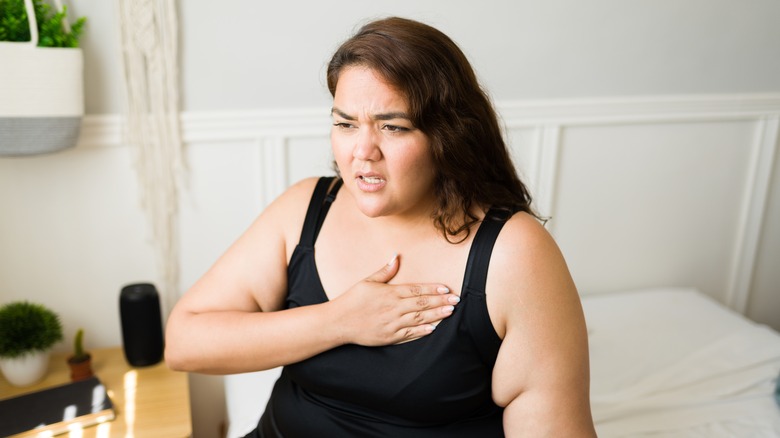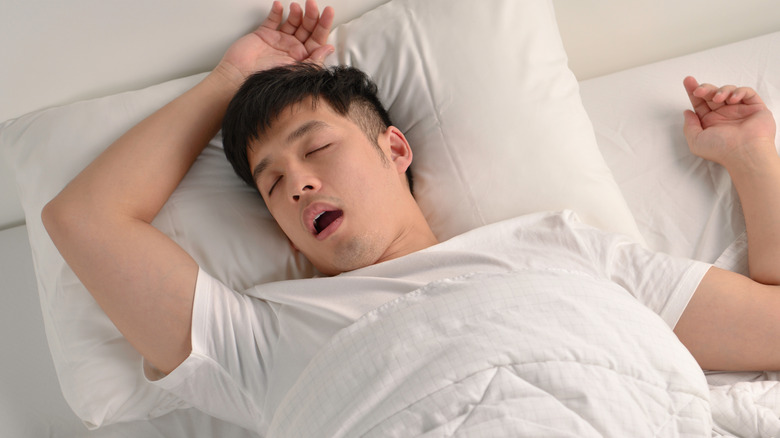What It Means When You Wake Up With A Racing Heart
A good night's sleep is critical for your mental and physical health, and waking up refreshed and peaceful can make a great start to your day. But sometimes waking up is not so nice. Rather than taking a deep cleansing breath as you roll over to turn off the alarm, you gasp as you notice your heart racing.
While it's understandable for you to have a rapid heart rate while you're exercising or running to catch the next subway train, it doesn't seem to make sense to wake up with your heart fluttering. It also can seem scary, perhaps inducing feelings of panic.
Rest assured, a rapid heart rate when you wake up isn't usually serious, according to Healthline. Sometimes a rapid heart rate in the morning has to do with what you put into your body, such as alcohol, sugar, or caffeine. However, other more serious reasons for a racing heart could be due to physical conditions such as atrial fibrillation (AFib), sleep apnea, or stress.
What you put in your body can increase your heart rate
How much alcohol you might have had the night before could affect your morning heart rate. A 2020 meta-analysis in the Cochrane Database of Systematic Reviews found that drinking a standard drink can elevate your heart rate by 5 beats per minute for up to six hours after drinking. Drinking more than that can increase your heart rate for up to 24 hours.
Excess sugar or refined carbohydrates in your diet can also have an impact on your heart rate. These simple carbs will hike your blood sugar, and your body releases cortisol because it thinks you're under stress. Not only will you feel a surge in your heart rate but may also feel some sweating (via Healthline).
Other drugs such as nicotine or caffeine the night before can impact your sleep and, subsequently, your heart rate the next morning. According to the Sleep Foundation, keeping an eye on your caffeine, alcohol, and nicotine intake in the evenings can reduce the likelihood of waking up with a rapid heart rate. You might want to track your heart rate the morning after you've used any of these drugs to monitor how your heart rate differs from other mornings.
Some more serious conditions can make your heart race
Stress or anxiety can cause you to feel your heart racing when you wake up. Stress can impact your sleep and cause you to ruminate over the source of your stress. You might also wake up feeling short of breath (via Healthline).
Sleep apnea can cause your heart to race when you wake up because your body is trying to respond to the lack of oxygen (via Manse Medical). Sleep apnea occurs when the muscles in the back of your throat relax and cut off your air passages. People with sleep apnea also snore, but the sleep disorder also comes with symptoms such as mood swings, irritability, depression, or anxiety. If you notice you're sleepy during the day and have some brain fog, you might have sleep apnea.
AFib occurs when your heart's chambers are out of sync, and your heart beats irregularly. It might feel like your heart flutters or skips a beat. If it's untreated, it can lead to problems such as blood clots, stroke, or other heart conditions, according to the American Heart Association.
Certain symptoms can also give you an idea of your condition, according to Tri-City Cardiology. Shaking could indicate diabetes, hyperthyroidism, fever, or a reaction to your medication. Shortness of breath might point to anemia, AFib, or anxiety. If a fluttering heart is also accompanied by chest pains or dizziness, these could be signs of a heart attack and need emergency medical attention.



